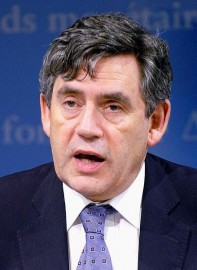
By Brendan Donnelly
For all the appearance of continuing Cabinet discussion and consultation, it is already clear what Gordon Brown will tell the House of Commons about the euro on 9 June. He will say that his economic criteria for British membership of the single currency have not been met; he will strongly hint that he does not expect these criteria to be met in the near future; he will reaffirm the government’s theoretical commitment to the principle of joining the euro; and he will probably throw a sop to the Britain in Europe coalition in the form of a legislative initiative which can be interpreted by those who wish to do so as preparation for holding a single currency referendum in the not too distant future. New Labour’s and particularly the Chancellor’s systematic ambiguity on the question of British membership of the euro will have been magnificently and triumphantly reaffirmed.
For Brownologists, all this could have been predicted many months ago. A mixture of personal, political and economic calculation has long made him much less enthusiastic about the prospects of an early referendum on the euro than is the Prime Minister. It was always extremely unlikely that a powerful Chancellor would allow himself to be railroaded by his Downing Street neighbour on what the New Labour government has until now represented as a purely economic decision. The howls of frustration from Peter Mandelson and others in the pro-euro camp are testament to Mr Brown’s successful reassertion of his authority in this matter.
But it would be wrong for the Chancellor and his allies to assume that nothing in the British debate on the euro has changed over the past few months. An important development has occurred. Those in the government, the Labour party and elsewhere who are genuinely eager for Britain to join the euro have realised that their passivity in the past six years has created the genuine danger that Britain may never join the single currency. Their Micawberish tactic of simply waiting for the Prime Minister and Chancellor to agree that the economic conditions were suddenly right for British membership of the euro has proved a spectacular failure. There is little prospect of such agreement coming about in the near future. Even if it did, winning the following referendum would now be highly problematic. Until it decrees that the five economic criteria for British membership of the euro have been met, the government cannot logically campaign for Britain to join the single currency. Those hostile to British membership of the euro are under no such constraints. The result of the government’s self-denying ordinance is plain in every opinion poll. It would be optimistic indeed to believe that the large and well-established majorities against the euro shown in these polls can be turned around in a referendum campaign of six months.
The Chancellor’s statement on 9 June will certainly be accompanied by briefings from the Prime Minister’s office that Mr Blair still hopes for a euro referendum next year. We shall be told that over the coming months Mr Blair will be moving over to the offensive in his advocacy of the single currency. Other pro-euro Cabinet ministers will doubtless rally to the Prime Ministerial lead. Some effort at least will be made by the government in the latter half of 2003 to make a sceptical British public love the euro.
But the success of these efforts will inevitably be limited unless the Chancellor is centrally involved in them. The Chancellor has a padlock on British entry into the euro, not merely through his ability to assess the five economic tests for membership, but also through his willingness or otherwise to act as an advocate for the single currency over the coming months. If Mr Brown, reasonably from his point of view, refuses such advocacy until he deems the five tests met, the government can bid farewell to any lingering hopes it may have of a euro referendum in this Parliament. It is an absolute precondition for any such referendum’s being won in 2003 or 2004 that the Chancellor starts and continues sounding enthusiastic about the euro in 2003.
It has come as a shock to many in the Labour party to realise that their government is today no nearer joining the euro than it was in 1997. Worse has been the realisation that there is no obvious way out of the cul-de-sac into which the government has manoeuvred itself. One suggestion to emerge is that the Labour Party should in its manifesto for the next General Election commit itself to holding a referendum within the twelve months following its reelection. There are political attractions to this proposal, which would allow a substantial period of pro-euro campaigning by the government before the actual referendum period. But any such undertaking in the manifesto would require the Chancellor’s agreement. No road leads past him. For Britain to move nearer joining the euro, Mr Brown must be convinced, persuaded, seduced, suborned or bribed into changing his present unenthusiastic view of the single currency. If the Prime Minister does know the key to changing the Chancellor’s mind on the euro, he has until now been surprisingly successful in concealing his possession of this knowledge.
Brendan Donnelly is Chair of Federal Union and a former MEP. He is now Director of the Federal Trust, and may be contacted at [email protected]. This article was first published by FT Online. The opinions expressed are those of the author and not necessarily those of Federal Union or the Federal Trust.
More information
Let’s have a real euro debate! – George Irvin
Snatching defeat from the jaws of victory: Britain and the Euro – George Irvin
Time to choose? Britain and the euro – Christopher Huhne MEP
